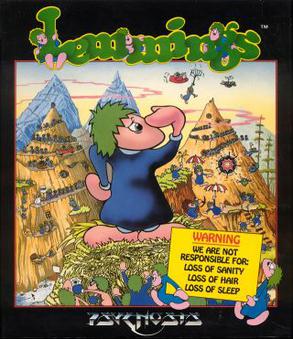
Lemmings is a puzzle–strategy video game originally developed by DMA Design and published by Psygnosis for the Amiga in 1991 and later ported for numerous other platforms. The game was programmed by Russell Kay, Mike Dailly and David Jones, and was inspired by a simple animation that Dailly created while experimenting with Deluxe Paint.

The Great Giana Sisters is a 1987 platform game developed by German studio Time Warp Productions and published by Rainbow Arts. The scroll screen melody of the game was composed by Chris Huelsbeck and is a popular Commodore 64 soundtrack. The game is heavily based on Nintendo's Super Mario Bros. (1985), which led to production being stopped shortly after release, but it later inspired a number of sequels.
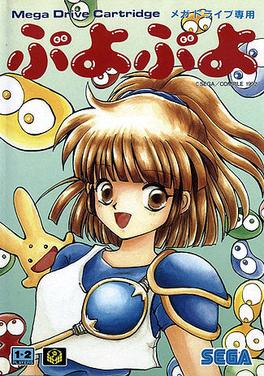
Puyo Puyo (ぷよぷよ) is a puzzle video game released in 1991 by Compile for the MSX2. Since its creation, it uses characters from Madō Monogatari. It was created by Masamitsu "Moo" Niitani, the founder of Compile, who was inspired by certain elements from the Tetris and Dr. Mario series of games.

Qix is a 1981 puzzle video game developed by husband and wife team Randy and Sandy Pfeiffer and published in arcades by Taito America. Qix is one of a handful of games made by Taito's American division. At the start of each level, the playing field is a large, empty rectangle, containing the Qix, an abstract stick-like entity that performs graceful but unpredictable motions within the confines of the rectangle. The objective is to draw lines that close off parts of the rectangle to fill in a set amount of the playfield.

Super Mario 64 DS is a 2004 platform game developed and published by Nintendo for the Nintendo DS. It was a launch game for the DS. Super Mario 64 DS is a remake of the 1996 Nintendo 64 game Super Mario 64, with new graphics, characters, collectibles, a multiplayer mode, and several extra minigames. As with the original, the plot centers on rescuing Princess Peach from Bowser. Unlike the original, Yoshi is the first playable character, with Mario, Luigi, and Wario being unlockable characters in early phases of the game.

Kirby's Avalanche, known in Europe as Kirby's Ghost Trap, is a puzzle video game developed by Compile and Banpresto and published by Nintendo for the Super Nintendo Entertainment System. It was released on February 1, 1995 in Europe and on April 25, 1995 in North America. It is a Western release of the Japanese Super Puyo Puyo featuring characters from the Kirby series. There was not a Japanese release, and the game remains the only Kirby title not released there. In Europe and Australia, the game was re-released on the Wii's Virtual Console service on July 27, 2007 and in North America on September 24, 2007. The game was re-released for the Nintendo Switch Online service on July 21, 2022.
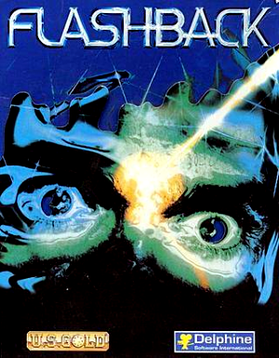
Flashback, released as Flashback: The Quest for Identity in the United States, is a 1992 science fiction cinematic platform game developed by Delphine Software of France and published by U.S. Gold in the United States and Europe, and Sunsoft in Japan.
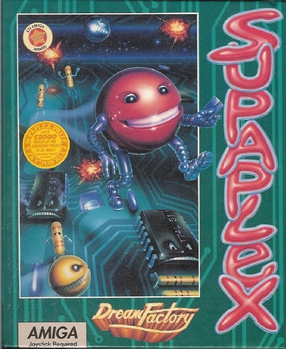
Supaplex is a video game created by Philip Jespersen and Michael Stopp, two Swiss students, and published by Digital Integration in 1991. It is an extended clone of Boulder Dash.

Puyo Pop Fever is a 2003 puzzle video game developed by Sonic Team and published by Sega. It is the fifth main installment in the Puyo Puyo puzzle game series and the second Puyo Puyo game to be programmed by Sonic Team after Puyo Pop. This was the start of what can be considered a reboot of the Puyo Puyo franchise, with this entry's plot revolving around Professor Accord losing her flying cane. Sega, which acquired the series' rights from Compile in 1998, published all the Japanese releases of the game, and also published the arcade and GameCube versions internationally. The game was scarcely released internationally, and certain versions were released by other publishers in those areas. The GameCube and Nintendo DS versions were released in North America. Europe received both versions plus the PlayStation 2, Xbox, Game Boy Advance, and PlayStation Portable versions. The Dreamcast version, released exclusively in Japan, was the last Dreamcast game developed by Sonic Team, the last first-party title released on the platform, as well as the final first-party title by Sega. The Dreamcast, Arcade and Playstation Portable versions are the only console versions to use sprites in place of 3D models.

Putty is a game developed by System 3 and released in 1992 for the Amiga. It was also released on the Super Nintendo Entertainment System in 1993 as Super Putty and Amiga CD32 version was published in 1994 under the same name.
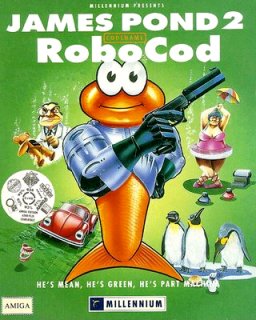
James Pond 2: Codename: RoboCod, also known as Super James Pond on SNES in North America, and Game Boy, and Super James Pond 2 in Europe, is a 1991 platform video game. It was developed by the same British teams as the original. The title music by Richard Joseph is a marimba-heavy rendition of the RoboCop film theme. It is the second installment in the James Pond series.

Bomberman: Panic Bomber is a 1994 puzzle video game developed and published by Hudson Soft for the PC Engine on December 22, 1994. It was later released for the Neo Geo, Super Famicom, Sharp X68000, FM Towns, NEC PC-9821, Virtual Boy, and PlayStation Portable. It saw a re-release for the Wii and Wii U's Virtual Console services. Panic Bomber is a falling block game with the players' goal being to clear matching blocks using bombs, ensuring that their screen does not fill and that their opponents' screens do. It received mixed to positive reception, identified as a decent game by multiple critics. It has been compared to the falling block puzzle game Tetris. The Virtual Boy version received a mixed reception for its handling of the platform's visual capabilities.
Micro Machines is a series of video games featuring toy cars, developed by Codemasters and published on multiple platforms. The series is based on the Micro Machines toy line of miniature vehicles.

Hebereke's Popoon is a two player puzzle video game developed and published by Sunsoft. It is based on the Hebereke series. Hebereke means drunk or untrustworthy. Popoon is an onomatopoeia for the sound made by the game pieces when they explode.
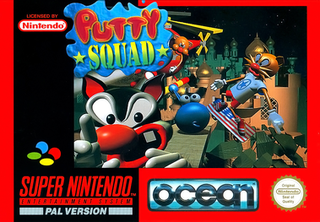
Putty Squad is a 1994 video game developed by System 3 and published by Maximum Games and Ocean Software. It was originally developed for the Amiga 1200, but that version was not released until the end of 2013; prior to that date the SNES version was the only one to be released. Sega Mega Drive and MS-DOS ports also existed, but were cancelled. It is the sequel to Putty (1992). In December 2013, the Amiga version was released as a Christmas gift on System 3's website. In October 2015, the Mega Drive version was also released by a Sega-16 user who got a hold of a working prototype.
Puyo Puyo (ぷよぷよ), previously known as Puyo Pop outside Japan, is a series of tile-matching video games created by Compile. Sega has owned the franchise since 1998, with games after 2001 being developed by Sonic Team. Puyo Puyo was created as a spin-off franchise to Madō Monogatari, a series of first-person dungeon crawler role-playing games by Compile from which the Puyo Puyo characters originated. The series has sold over 9 million copies, including the Madō Monogatari games.














